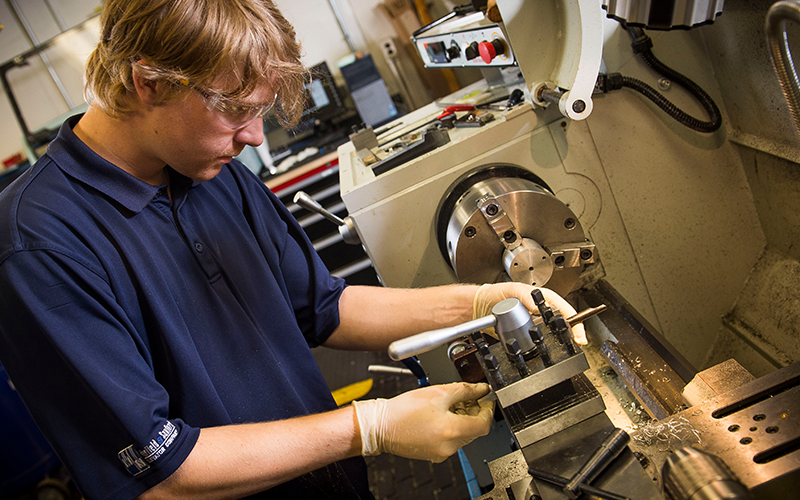ENES 100: Introduction to Engineering Design
Corequisite: MATH 140. Students work as teams to design and build a product using computer software for word-processing, spreadsheet, CAD, and communications skills. 3 credits.
ENES 102: Mechanics I
Corequisite: MATH 140. The equilibrium of stationary bodies under the influence of various kinds of forces. Forces, moments, couples, equilibrium, trusses, frames and machines, beams, and friction. Vector and scalar methods are used to solve problems. 3 credits.
ENES 220: Mechanics II
Prerequisites: ENES 102, MATH 141, PHYS 161. Stress and deformation of solids-rods, beams, shafts, columns, tanks, and other structural, machine, and vehicle members. Topics include stress transformation using Mohr's circle, shear and moment diagrams, derivation of elastic curves, and Euler's buckling formula. 3 credits.
ENES 221: Dynamics
Prerequisites: ENES 102, MATH 141, PHYS 161. Two lectures and one two-hour laboratory per week. Systems of heavy particles and rigid bodies at rest and in motion. Force, acceleration, work-energy, and impulse-momentum relationships. Motion of one body relative to another in a plane and in space. 3 credits.
MATH 206: Introduction to MATLAB
Prerequisite: MATH 141. This course is intended to prepare students for subsequent courses requiring computation with MATLAB. Covers basics of MATLAB including simple commands, variables, solving equations, graphing differentiation and integration, matrices and vectors, functions, M-files and fundamentals of programming in the MATLAB environment. 1 credit. Mechanical Engineering students entering the major in Fall 2017 or later are required to take ENME 202: Fundamentals of Engineering Computing in place of this course unless acceptable programming course credit has been earned. Contact a Mechanical Engineering advisor for more information on accepted programming credit.
ENES 232: Thermodynamics
Prerequisites: PHYS 260, PHYS261. Introduction to thermodynamics. Thermodynamic properties of matter. First and second laws of thermodynamics, cycles, reactions, and mixtures. 3 credits.
ENME 202/ENAE 202: Computing Fundamentals for Engineers
Prerequisite: MATH 140. Introduction to computational tools for the solution of engineering problems. C++ & MATLAB programming including branching and loops, functions, file handling, arrays, and data structures. Students will be introduced to object-oriented programming, basic computing, algorithms, and principles of software engineering. 3 credits. Mechanical Engineering students entering the major in Fall 2017 or later are required to take ENME 202: Fundamentals of Engineering Computing in place of MATH 206 unless acceptable programming course credit has been earned. Contact a Mechanical Engineering advisor for more information on accepted programming credit.
ENME 272: Introduction to Computer Aided Design
Prerequisite: ENES 100; Co-requisite: MATH 141 or equivalent. Fundamentals of CAD, using solid modeling packages (Pro/E, SolidWorks, and Autodesk Inventor). Two and three dimensional drawing. Dimensioning and specifications. Introduction of CAD based analysis tools. Students will complete a design project. Credit only granted for ENME 272 or ENME 414. Students entering the Mechanical Engineering program in fall 2012 or later are required to take ENME 272 for their curriculum but may substitute ENME 414 in place of ENME 272 if desired. 2 credits.
ENME 331: Fluid Mechanics
Prerequisite: ENME 232, ENES 221. Principles of fluid mechanics. Mass, momentum, and energy conservation. Hydrostatics. Control volume analysis. Internal and external flow. Boundary layers. Modern measurement techniques. Computer analysis. Laboratory experiments. 3 credits.
ENME 332: Transfer Processes
Prerequisite: ENME 331. The principles of heat transfer. Conduction in solids. Convection. Radiation. Modern measurement techniques. Computer analysis. 3 credits.
ENME 350: Electronics and Instrumentation I
Prerequisite: PHYS 270 and PHYS 271. Modern instrumentation. Basic circuit design, standard microelectronic circuits. Digital data acquisition and control. Signal conditioning. Instrumentation interfacing. Designing and testing analog circuits. Laboratory experiments. 3 credits.
ENME 351: Electronics and Instrumentation II
Prerequisites: ENME 350 and PHYS 270 and PHYS 271. Continuation of ENME 350. Modern instrumentation. Basic circuit design, standard microelectronic circuits. Digital data acquisition and control. Signal conditioning. Instrumentation interfacing. Designing and testing analog circuits. Laboratory experiments. 3 credits.
ENME 361: Vibration, Controls, and Optimization I
Prerequisites: ENES 220, ENES 221, MATH 246, and MATH 206, ENME 271, ENME 202 or equivalent. Fundamentals of vibration, controls, and optimization. Analysis and design in time, Laplace, and frequency domains. Mathematical description of system response, system stability, control, and optimization. Optimal design of mechanical systems. 3 credits.
ENME 371: Product Engineering and Manufacturing
Prerequisite: ENES 221, ENME 392 or STAT 400. Business aspects of engineering product development. Relationship of design and manufacturing. Product specification. Statistical process control. Design team development. The development process. 3 credits.
ENME 382: Engineering Materials and Manufacturing Processes
Prerequisite: ENES 100. Co-requisite: MATH 241. Recommended: PHYS260 and PHYS261. Basic material structures and properties. Mechanical behavior of materials. Manufacturing process theory. Material processing. Quality assurance. Laboratory experiments. 3 credits.
ENME 392: Statistical Methods for Product and Process Development
Prerequisites: MATH 241. Integrated statistical methodology for improvement of products and processes in terms of performance, quality, and cost. Designed experimentation. Statistical process control. Software application. Laboratory activities. 3 credits.
ENME 400: Machine Design
Corequisite: ENME 361. Uses and limitations of finite element analysis, analysis of machine components: straight and curved beams, gears, shafts, plates, shells, bolts, screws, and flanges. 3 credits. This course is an elective course for most students entering the Mechanical Engineering program prior to the Fall 2015 semester.
ENME 462: Vibration, Controls, and Optimization II
Prerequisites: ENME 351 and ENME 361. Continuation of ENME 361. Fundamentals of vibration, controls, and optimization. Analysis and design in time, Laplace, and frequency domains. Mathematical description of system response, system stability, control, and optimization. Optimal design of mechanical systems. 3 credits
ENME 472: Integrated Product and Process Development
Prerequisite: ENME 371. Integration of product development with the development process. Design strategies. Product architecture. Design for manufacturing. Selection of materials. Design for assembly. 3 credits.
